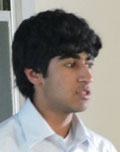PRIMES: Ashwin Murali's Story

From a young age, I was always fascinated by mathematical patterns in nature. One of those patterns was the Fibonacci spirals present in sea shells. As this interest in mathematics in relation to nature evolved, I became more inclined to investigate the molecular aspects of a cell in search of other simple mathematical happenstances produced by nature.
Nature and mathematics are each delightful on their own but together they are vivaciously irresistible. Having been to PROMYS, research experience was far from foreign to me but MIT PRIMES takes one's research ability to the next level, integrating it with principles applicable to any branch of science, not just the specific field one is in. My mentors introduced us to the basics of simulating organic polymers demonstrating how their behavior and structure is similar to the behavior and path of random walks. It is very fascinating how complex organic molecules' behavior can be approximated with such a simple mathematical construct. Working at the intersection of programming, biology, and mathematics, we learned methods of simulating organic polymers, a technique applied toward our individual research problems, one of which evolved into my work on Global Positioning of Interphase Chromosomes Mediated by Local Chromatin Interactions, recently presented at the Cold Spring Harbor Conference on the Dynamic Organization of Nuclear Function. The experience of presenting a poster was surreal and I owe this experience to my mentors, my teachers, and the PRIMES program. To say the PRIMES is life changing is an understatement.
I would like to send my greatest thanks to everyone at Mirny Lab and the PRIMES program, especially my mentors Maxim Imakaev, Geoff Fudenberg, and Dr. Leonid Mirny who have aided me through this journey. PRIMES and the time spent at Mirny Lab has been a life changing experience, as it will continue to be!
Ashwin Murali worked on the project Global positioning of interphase chromosomes mediated by local chromatin interactions under the mentorship of Geoffrey Fudenberg and Maxim Imakaev.
Email us: primes@math.mit.edu
